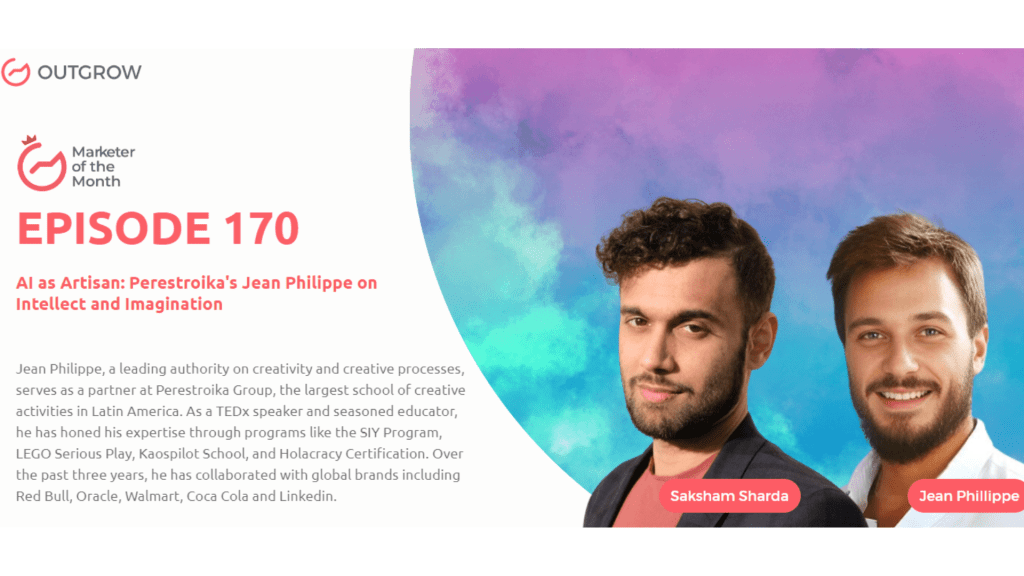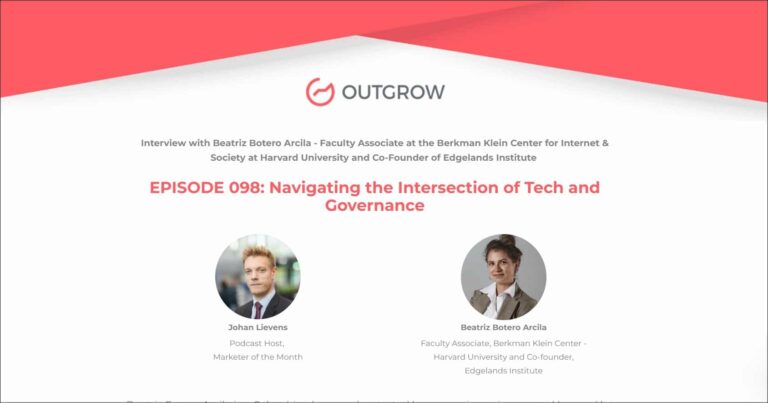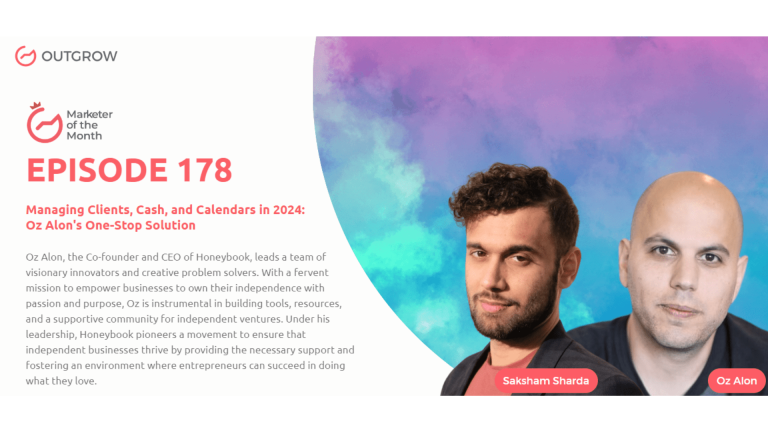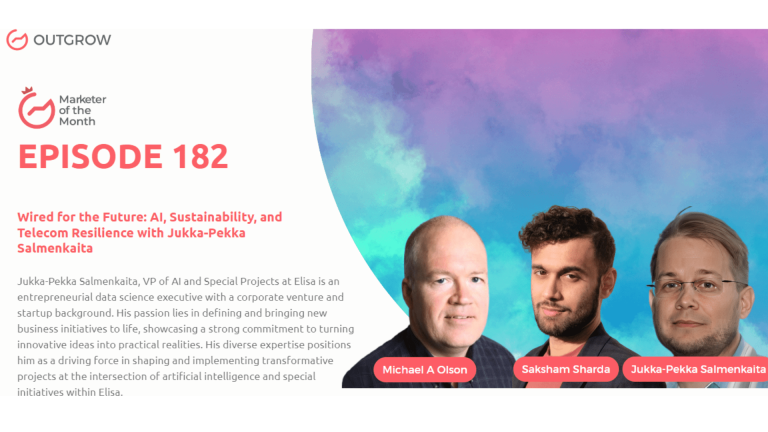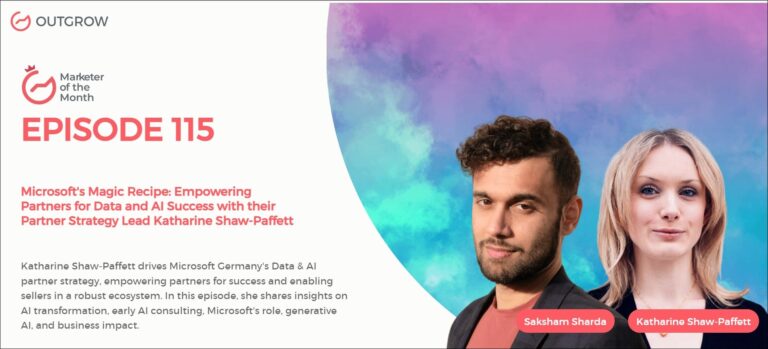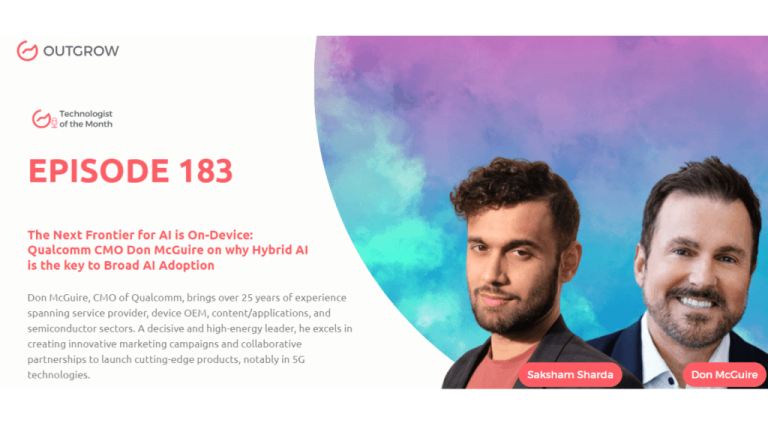EPISODE 170: Marketer of the Month Podcast with Jean Philippe
Table of Contents
Hey there! Welcome to the Marketer Of The Month blog!
We recently interviewed Jean Philippe for our monthly podcast – ‘Marketer of the Month’! We had some amazing insightful conversations with Jean and here’s what we discussed about-
1. Perestroika’s Creative Methodology: Engaging through both semantic and episodic memory.
2. Diverse Educational Offerings: Schools, workshops, and online festivals, tailored to diverse topics and industries.
3. AI as a Learning Tool: Utilizing it to explore different perspectives and enhance creativity.
4. Key Topics in International Events: Emphasizes on the symbiosis of neuroscience and creativity for future success.
5. Barriers to Creativity: Work on creative skills, experiment with different processes, and consistently seek inspiration.
6. The Future of Creativity: Balance between human and machine learning to find equilibrium to address new challenges.
About our host:
Dr. Saksham Sharda is the Chief Information Officer at Outgrow.co. He specializes in data collection, analysis, filtering, and transfer by means of widgets and applets. Interactive, cultural, and trending widgets designed by him have been featured on TrendHunter, Alibaba, ProductHunt, New York Marketing Association, FactoryBerlin, Digimarcon Silicon Valley, and at The European Affiliate Summit.
About our guest:
Jean Philippe, a leading authority on creativity and creative processes, serves as a partner at Perestroika Group, the largest school of creative activities in Latin America. As a TEDx speaker and seasoned educator, he has honed his expertise through programs like the SIY Program, LEGO Serious Play, Kaospilot School, and Holacracy Certification. Over the past three years, he has collaborated with global brands including Red Bull, Oracle, Walmart, Coca Cola and Linkedin.
AI as Artisan: Perestroika’s Jean Philippe on Intellect and Imagination
The Intro!
Saksham Sharda: Hi, everyone. Welcome to another episode of Outgrow’s Marketer of the Month. I’m your host, Dr. Saksham Sharda, and I’m the creative director at Outgrow. co. And for this month we are going to interview Jean Philippe, who is the Partner at Perestroika.
Jean Philippe: Great to be here. Thank you.
Don’t have time to read? No problem, just watch the Podcast!
Or you can just listen to it on Spotify!
The Rapid Fire Round!
Saksham Sharda: So, Jean, we are going to start with a rapid-fire round. Just to break the ice, you get three passes in case you don’t want to answer the question, you can just say pass. But try to keep your answers to one word or one sentence only.
Jean Philippe: Okay.
Saksham Sharda: Alright. So the first one is, at what age do you want to retire?
Jean Philippe: 60.
Saksham Sharda: How long does it take you to get ready in the mornings?
Jean Philippe: Five minutes.
Saksham Sharda: Most embarrassing moment of your life.
Jean Philippe: Hmm, most. There’s a moment in my life. Maybe one day I was at a stage in a sentence. I forgot my thoughts. During a talk in front of a hundred people.
Saksham Sharda: Favorite color?
Jean Philippe: Blue.
Saksham Sharda: What time of day are you most inspired?
Jean Philippe: Morning for sure.
Saksham Sharda: How many hours of sleep can you survive on?
Jean Philippe: Can I survive, I was saying none, but I need at least six hours to be in shape.
Saksham Sharda: Fill in the blank. An upcoming marketing trend is _____.
Jean Philippe: Marketing trend is a reality.
Saksham Sharda: The city in which the best kiss of your life happened?
Jean Philippe: Thailand.
Saksham Sharda: Pick one. Mark. Zuckerberg or Elon Musk?
Jean Philippe: I pass.
Saksham Sharda: The biggest mistake of your career.
Jean Philippe: Not following my dreams earlier.
Saksham Sharda: How do you relax?
Jean Philippe: Surfing.
Saksham Sharda: How many cups of coffee do you drink in a day?
Jean Philippe: At least one.
Saksham Sharda: A habit of yours that you hate?
Jean Philippe: Biting my nails.
Saksham Sharda: The most valuable skill you’ve learned in life.
Jean Philippe: Workspace back.
Saksham Sharda: The last one is your favorite Netflix, Amazon, or any online show or TV show.
Jean Philippe: One. I’ll say Breaking Bad. The first one that came to my mind.
Saksham Sharda: Alright, so that’s the end of the rapid-fire round. Now we can move on to the bigger questions unless there’s one rapid-fire question that you want to elaborate more on. Anywhere you felt you wanted to give a bigger answer.
Jean Philippe: I’m okay.
The Big Questions!
Saksham Sharda: Okay. So for the bigger questions, the first one is, as a partner at Perestroika, could you share some insights into the creative activities and programs offered by the school?
Jean Philippe: Yeah, sure. So, the basic basis for our projects, it’s our methodology. We have a serious commitment to the act of teaching and learning. And this is what sets us apart from other schools. I’m based in Portugal, but our company started in Brazil and we are now working with other countries. And, I feel that there’s a boom related to education, right? And creating new courses, and new programs. And we are a 16-year company. And we’ve seen this changing a lot. The market is changing a lot. Our methodology, which is Rio, is based on experience, which means that everything that happens during a course or a class is something that we think about and we create any kind of exercise or dynamic or experience to help the participants connect the content that we’re bringing. So this ends up connecting the individual with the content. And there’s a neuro part of that that we studied that explains why this works because we are connecting both memories. We have semantic memory and episodic memory. Se semantic memory refers to a type of declarative memory that is towards general knowledge. For example, you know that Paris is the capital of France, or you understand the concept of gravity, right? So that it’s stored in our semantic memory. And 99% of the school’s methods are methodologies based on the traditional way of how we can teach and learning. It’s based on semantic memory. We studied episodic memory, which is a form of declarative memory that stores personal experiences and events in a sequential and temporal order. For example, you remember your last birthday celebration, right? If you close your eyes, you will like to transport yourself to the celebration. You’ve gotta steal the experience again. You’re gonna be able to feel the hugs and the energy, right? So that’s the episodic one. It’s related to the experience that we had. So when we create an experience inside the class, inside the workshop, inside the company that we are talking to, we are connecting both memories, the exotic one and the semantic one, because we create some experience that will be able to do something very profound for people in their experience. Usually, people remember first the experience and then the content, and then they associate that with both events. So I would say that that’s the basics for everything that we want to develop. So it’s gonna be a workshop or just a talk or a cooperative academy that we developed inside companies. So everything is based on that methodology, based on experience and connecting both manners.
Saksham Sharda: So does the school offer all of these workshop talks and all of these combined how does it work?
Jean Philippe: Exactly? We used to say that we are what the tagline defines us. It’s a scent of knowledge. So everything related to education, knowledge, and ways of learning, we can develop anything. So that’s Cent knowledge. It can be like a school, it can be a workshop, it could be an online festival for poker lovers or soccer lovers. I mean, you know what I mean? So as we know and see our methodology as the base, we don’t need to be the experts. So for example, you can be an expert on podcasts, and then we’re gonna say, okay, let’s create a course helping people to create their workshop podcast. Okay, so let’s do it. You know the task. I have the knowledge of the learning process and the methodology to help create and transform your knowledge into an experience that everybody that will listen to or attend to our class or workshop will feel, and leave and experience something different that will help them learn better. So it could be anything that you can imagine. It could be a business trip, it could be a conference, a traditional conference, or it could be a day at the museum where we wanna learn about contemporary art.
Saksham Sharda: So in the past, it seems you’ve attended various programs like the SIY program, the Lego Serious Play, and the Chaos Pilot School. How have these experiences influenced your understanding of creativity and leadership when it comes to what you’re doing now?
Jean Philippe: Yeah, I would say a lot. I mean there is something curious about that because When I am a teacher, and despite being a teacher, I love being in the position of a student. I love the process of learning. So whenever I can, I look for courses and training to improve my content because everything that I talk about is something that I develop, connecting things that I experienced that I read and that I learned. And also to see what’s being done around the world, right? I mean Legacy Today or Harvard doing, right? So besides that, I believe that we always have something to learn. And each of these helps me with something. So I could say that the Search Insider Self program is a program that was created inside Google, and it relates to mindfulness, neuroscience, and leadership. For me, this experience brought, I would say an integral vision of humans and concepts concept that I take to this day to develop my continent theories, the Lego serious play, which I’m a huge fan, helped me to understand the power of relax and how important it’s to insert the play, the fun, especially inside the work environment. And the chaos pilot experience, for me, was much more about the power of a diverse group. So for the attended use, I had 20 teachers from 12 different countries. I was in Brazil and the first president to attend the course. And, I could feel the importance and kind of I already knew that I already knew that. But it’s different when we are in this when we’re feeling and learning at the same time. I mean the different cultures, ideas, and visions, how much this enriches the learning process and also enriches my experience. So every time that I talk about creativity, every time that I try to create, and organize groups inside companies, I always put in the first place the necessity to have gender diversity in everything that you can imagine. Because when we’re talking about creativity, we need to start with different points of view. And that way to have different points of view, in my opinion, is to have a diverse lobby with different perspectives.
Saksham Sharda: And to what extent do you feel now that creativity is being influenced by artificial intelligence? And what aspects of this, are you seeing it in Perestroika or in your workshops in everything you guys do?
Jean Philippe: Well, I feel that I’m in the position of a learner, again as a student, because I use it every day. And, I try to open the eyes of my partners and all my teams because we have people that see AI and everything happening now, with a negative perspective. And I’m a, so I believe that this may and will help us as human beings. You can be talking about developing our creativity, developing our productivity, and the what’s, what’s the difference? I mean what, what can separate people that will use it and will understand this as a trampoline to help us develop ourselves and the others that we see as a threat is how we are related to it. I see AI today as a personal assistant, and I end everything that comes to my mind, and I think that I have an answer before I put it into practice. I just use the AI to help me see different perspectives, and see different kinds of things that I’m not seeing. So now we are looking to the markets and experimenting and, and trying to test different platforms, different kinds of AIs and try to see where they work in a real way. But, at the moment, we are in this kind of better tester mode, I would say.
Saksham Sharda: And so how do you think AI will impact the accessibility of creative tools and resources? Do you think it’ll democratize creativity or create new barriers for certain individuals or groups?
Jean Philippe: Well, that’s a great question. I would say yes, AI has the potential to democratize creativity and enhance accessibility. How well providing users with these friendly tools and of course, expanding the representation of different options that we have when we are talking about AI. But this will only happen if the access remains free. I mean, of course, we have paid versions already, right? But I think it’s fundamental to, if we want to create, if we want to eliminate and or reduce the gap that already exists today, because it, it’s, it’s funny to say what, what can AI bring us in terms of barriers democratization, but we already have those barriers, right? I mean, the access that I have to information is different from what you have. I’m not saying that it’s better or it’s worse, but it’s different, right? And remain different. So if we are adding some layer, which is the layer that I’m calling AI, and we can see it as a way to democratize knowledge, of course, the basics should remain free. I dunno how to do it. I’m not working, I’m not monetizing myself with AI, not my business either. But I’m sure that there are different ways to monetize it and keep the access at a minimum, the access to experiment or try or, or be able to know how the AI works and be able to get something of it, not maybe in a professional way. So if you want a professional way, you probably have to pay for that. But I believe that deportation is there at the same level as I saw it, as we saw it as a society when we saw the internet coming in 89, and when things were there they wrote a hyper tax market language, right? But 20, 30 years after that, we’re questioning how the impact of the internet could be and how they are, how the impact is, right? So, as I said, I’m optimistic, so I believe that yes, it has the potential, the potential, but of course, how this will evolve in terms of societal rules that will define the success of the democratization of knowledge.
Saksham Sharda: So when you speak at international events which topics related to creativity and innovation have resonated the most with your audience? Could you give us some examples?
Jean Philippe: Yes. Well, I would say that nowadays the most interesting topic that I feel people are interested in is the combination of how the brain works and how human beings behave. Because we are living in this symbiosis world, right? I mean, and when I see, when I look to the future, I see much more of a combination of those perspectives. And if we don’t understand human behavior and how can we censor ourselves, how can we see and feel that some stress levels are overcoming the normal, we can regulate ourselves, we are gonna probably, we’re gonna have more opportunities, we’re gonna have more success in our lives, in our human’s relationship. On the other hand, if we don’t understand how our rape works, how our ideas evolve, and how a new thought arrives, we are gonna struggle in that hand again. So I love to talk about the combination of those two aspects. When I talk about creativity, for example, I used to talk to businessmen and businesswomen. There are sometimes things about creativity. Now creativity is for artists, for musicians. It’s not for me. I’m the CEO of a big bank corporation. I don’t need that. I need to understand about numbers. And then I always try to, for that kind of audience, I always try to bring some more skeptical way of seeing creativity. And I use my neuroscience knowledge to say, okay, you probably don’t believe that creativity is important, but understand how the brain works. Have you heard about neuroplasticity? For example, Neuroplasticity is a recent discovery from neuroscience that our brain can adapt itself. Before 2000, we believed that the brain was something tactical, right? I mean, our brain evolved until we were five. And after that, the only thing that changed in our brain was the connections, the synapses. But no, after 2000, after very important research on taxi drivers from Longo, we discovered that our brain can be involved like a muscle. So if we understand that, if you accept that, and every time that we have a new idea, every time that we put effort to use a creative tool, or to put effort to not only come up with one idea but try to come up with 50 ideas, we are training our brain. We’re changing the structure of our brains. And with this change, the next day, if we keep doing it, we are gonna improve our ideas, improve the results of our work. So I try to combine that single view of creativity with neuroscience, with the brain, understanding of how things work inside our brain, and also what makes us feel like that. Because we know how frustrating it is when you have a lot of ideas and you present that to your boss or whatever, and then people say, okay, we won’t use anything. So that’s useless. So the idea is to understand and, and try to hack yourself, your behaviors, and also understand how your brain works, and then combine that you’re gonna be in a high level of performance.
Saksham Sharda: So speaking of this kind of creativity, you’ve also worked with global brands like Red Bull, Oracle, and Coca-Cola. What challenges and opportunities do you encounter when trying to foster this kind of creativity within large organizations?
Jean Philippe: Yeah. The best part of working with great and big companies it’s about the amount of opportunity available for creativity to happen in those environments, right? So, of course, as you compare to a small company, there are also opportunities to develop creativity, but certainly the amount is smaller. So therefore, whenever I have the opportunity to be with things, from large companies or corporations, I immediately remind them of this. After all, usually after a while in the same context, we stop seeing opportunities and we start seeing only failures or things that bother us, right? So I try to show them to change their focus and try to see opportunities. When you start seeing opportunities, you start to open your creative process, right? So that’s the first thing. The second one is when you are working with large corporations, usually, you have a diverse team. And I just talk about the importance of diversity, right? So different profiles, different backgrounds, and this for creativity, it’s fundamental. So if I don’t see diversity in groups that I’m working with inside companies, after the workshop or I talk with the HR department, I say, Hey guys, I miss something. I miss diversity. If you want to develop creativity inside a company, you need to have diversity. That’s a fundamental point. And finally, to be able to join a high-performance company, usually, you have high-performance people. And working, with people who have the determination to make all the difference. And the people that understand the outcome of the job, it’s fundamental, especially in the creative field where dedication and effort are fundamental for the result. So those opportunities, I would say, are something that I always try to show the audience, and also use as a facilitator.
Saksham Sharda: So in your experience, what are some of the common barriers or misconceptions that hinder individuals from fully embracing their creative potential?
Jean Philippe: I would say that people don’t understand that creativity needs effort. You need to put in work, you need to try hard. It’s not easy to have good ideas, but usually, people say you know what, I have good ideas when I’m having a shower, so I’ll have to come back home and then have a shower. I’ll say, okay, so you’re gonna ask your boss to put some bathroom, shower inside your department so that we don’t have this possibility anymore. I mean, sometimes, or some years ago, maybe we had the whole energy, and the whole myth of the creative genius, right? I mean, I’m gonna wait for my ideas, and if they’re my ideas, they’re not coming. I don’t have any ideas. We don’t have this opportunity anymore. We don’t have this privilege anymore. We need to seek our opportunity. We need to go and try to reach inspiration. And that’s hard for everybody to understand because it’s something that, okay, but how can I do that? How do I chase my ideas, how do I chase inspiration? And there’s no secret about it. It’s not impossible. It’s just curating a method. Understand your process of having ideas, how your brain works, and how you behave when you are struggling with ideas, and this combination, you have thousands of creative processes of tools. Try to use it, try to do something different. Oh, but I tried last week and didn’t work. That’s why I’m doing all the things again the same way. Okay, so that’s your choice. So it’s for me, the most important issue that I always try to, help people is how much work you are doing on creativity. How much effort did you put in what was the last book that you read about creativity? If you don’t do this, you won’t learn, you won’t develop. It’s an ability you wanna play. You wanna learn how to play tennis, what are you gonna have to do? You’re gonna have to grab a rack and start to, but right. Go to the field, right? It’s the same thing. If you wanna learn to cook a new dish, a new dish, or a new plate, you have to put your hands on the same way. You have to experiment with different processes and different creative tools. And of course, it won’t work. Usually the first time, it won’t work, but you’re gonna improve each day. You’re gonna be better and better and bad. And people, they, they have it hard for them to see that. And I struggle a lot trying to open their eyes to that.
Saksham Sharda: So what would you have to say about people who say they do have a lot of creative ideas, but they never really end up implementing them, or they’re not consistent in implementing them, and so they start a lot of projects, but they never finish anything.
Jean Philippe: Yeah. I used to play it’s not a job, but I used to say that the word that has two different types of people in the world, right? The ones that have good ideas have good thoughts. And what they do is, they open a note saying ideas, and they write down all the ideas, and they have a lot of beautiful ideas, right? Okay, cool. And your other idea, you have the second group that they have ideas. They have brilliant thoughts, and not only do they open the notebook and they write them down, but they put them in practice, they go there and do it. And it’s funny that you mentioned that because of our slogan, I would say, if we’re a company from the nineties, it’s go there and do it. Perestroika used to sign that. So good ideas. Everybody can have good ideas, right? But the difference between having a good idea and putting practice into practice is a huge gap. And it’s not enough to have good ideas. You could have had a great idea to start this podcast, I don’t know how many years ago, but one day you said, okay, now I have to do it. And on the day that you start, since the day you start to put in practice your podcast, how much did you learn about that? I’m sure it was amazing. You had no idea how many things you could learn since the day you started doing that. And with the idea, only write it down on your piece of paper. You don’t have this opportunity. So I would say to that person, you have a great idea. Okay, cool. But that’s not enough. It’s not enough. That’s halfway. I won’t say even halfway. That’s 20%. You have 80%, which is how it works, put it into practice and see this idea getting to life.
Saksham Sharda: So do you have any interesting case study or a story that you can tell us about an idea of a client of yours or in your life that you felt was creatively taken up and had a beautiful significant impact or result or an interesting result?
Jean Philippe: Yeah, sure. I loved when Google launched the 20% time, you know, the 20% time was a policy that allowed pl Google’s employees to dedicate 20% of their work working hours to pursuing their passion doing some side projects or innovative ideas. So, we created our kind of 20% time inside Perestroika which was like every day in a week. We did the schedule, but we could, like, have an afternoon off and this afternoon off could be in the group or everybody. Oh, let’s go to a museum and try to just hang out. Or it could be individual. Each person can decide, okay, I just wanna stay, I’m gonna read this book. I’m gonna write a thing about that. I think that creating space for creativity or creative work is fundamental. We’re not used to doing this. We have our agenda or our schedule. It’s always like, we don’t have any time slot to create. We just have meanings or we have to decide that. But where is this lot for the creative process, for the creative work? So we kind of use the 20% Google time as an inspiration for us, and we organize that. Now, we are a little bit evolved on that. And we have like the Friday off the last Friday of the month, it’s off, but it’s not guided to the creative work. It’s up. It’s off. So if everybody wants to stay and just leave, it’s okay, we kind of felt that our team needed more opportunities to do whatever they wanted and not necessarily guide them to creative work. And I’m a huge fan of Nigo, right? And I was at Web Summit Lisbon last year, and I attended the talk. I represented a person from Nigo, and she explained what happened to Nigo in the two thousands, and how hard it was for them to kind of go with the evolution of technology and things like that. So they were struggling a lot with that. And then they decide to get one step behind and see what the values of the brand are, right? What makes a legal love brand? And then they embrace that and they embrace creativity, embrace innovation. And, they did some kind of reevaluation of the product line. So they focused on open-ended play experiences collaborating with the huge amount of passionate fans in the community. And with that, they co-create new ideas, for example, Lego Mindstorms kits, which was a huge success. Anyways, they, they, they understand the moment, the environment, the context of the world and said, okay, we’re struggling, but we have something important that made us be Lego. What is that? Let’s go back again and try to use that as a base. And then, okay, connect diversity, diverse community, passionate about Lego, and then co-create that. So I would like to highlight those two examples.
Saksham Sharda: So all in all when you take everything you’ve said today into account, how do you see the future of creativity and creative processes evolving? Like particularly in the context of technological advancements and changing work dynamics. like what does the future hold?
Jean Philippe: I would say balance. I would say we have to find the balance between human learning, creativity, innovation, and machine learning, creativity, and innovation. If we don’t find that balance, we’re gonna probably, if we don’t have balance, we fall. Right? And, I see the few, again, I’m optimistic, I’m sure that we are gonna find a balance. Not everybody from everywhere will find a balance, but the majority of humankind will find a balance. And that’s something that I see as a future. Of course, we are gonna have to learn how to deal with new problems, with new challenges, right? But that’s it. Since the day we start evolving and thinking and imagining we have been solving new challenges. So of course, the challenge we’ll keep, they are gonna change, they will change because of the environment, because of the context of the world. But I see the future with balance.
Saksham Sharda: And so the last question for you is of a personal kind. It is, what would you be doing in your life, if not this right now?
Jean Philippe: Wow. I will say surfing but nobody will pay me for the desk because I’m not a great surfer, but I love the sport. So I dunno, I would try to figure it out somewhere to survive with that.
Let’s Conclude!
Saksham Sharda: Thanks, everyone for joining us for this month’s episode of Outgrow’s Marketer of the Month. That was Jean Philippe, who is the Partner at Perestroika.
Jean Philippe: Great to be here. Thank you.
Saksham Sharda: Check out the website for more details and we’ll see you once again next month with another marketer of the month.

Muskan is a Marketing Analyst at Outgrow. She is working on multiple areas of marketing. On her days off though, she loves exploring new cafes, drinking coffee, and catching up with friends.

